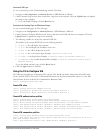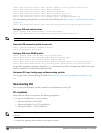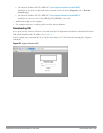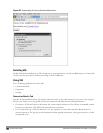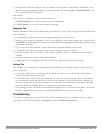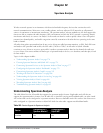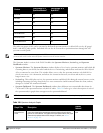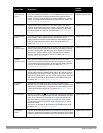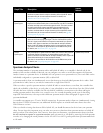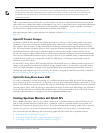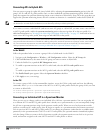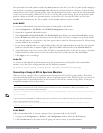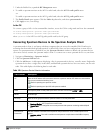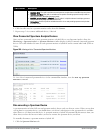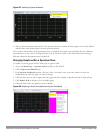
573 | Spectrum Analysis DellPowerConnectW-SeriesArubaOS6.2 | User Guide
Graph Title Description
Update
Interval
interference power data for multiple channels, while a hybrid AP shows
information only for its one monitored channel. For details, see
"Interference Power" on page 598.
Quality
Spectrogram
This plot shows quality statistics for selected range of channels or
frequencies as determined by the current noise floor, non-Wi-Fi (interferer)
utilization and duty-cycles and certain types of retries. This chart can also
be configured to show channel availability, the percentage of each
channel that is unused and available for additional traffic. Spectrum
monitors can show data for multiple channels, while a hybrid AP shows
information only for its one monitored channel. For details, see "Quality
Spectrogram" on page 600.
Updates every 5 seconds
Real-Time FFT Fast Fourier Transform, or FFT, is an algorithm for computing the frequency
spectrum of a time-varying input signal. This line chart shows the power
level of a signal on the channels or frequencies monitored by a spectrum
monitor radio. Spectrum monitors can show data for multiple channels,
while a hybrid AP shows information only for its one monitored channel.
This chart is not available for W-AP120 Series or W-AP68 access points.
For details, see "Real-Time FFT" on page 601.
Updates every second
Swept
Spectrogram
This plot displays FFT power levels For details, see or the FFT duty cycle for
a selected channel or frequency, as measured during each time tick.
Spectrum monitors can show data for multiple channels, while a hybrid AP
shows information only for its one monitored channel.
This chart is not available for W-AP120 Series or W-AP68 access points.
For details, see "Swept Spectrogram" on page 603.
Updates every second
Spectrum Analysis Clients
The maximum number of spectrum monitor radios and hybrid AP radios on a controller is limited only by the
number of APs on that controller. If desired, you can configure every radio on an AP that supports the Spectrum
Analysis feature as a spectrum device. A dual-radio AP can operate as two spectrum devices, since each radio can be
individually configured as a spectrum monitor (SM) or hybrid AP.
A spectrum analysis client can simultaneously access data from up to four individual spectrum device radios. Each
spectrum device radio, however, can only be connected to a single client WebUI.
When you select a specific spectrum monitor or hybrid AP radio to stream data to your client, the controller first
checks the availability of the device, to verify that it is not subscribed to some other client. Once the SM or hybrid
AP radio has been verified as available, the SM or hybrid AP establishes a connection to the client and begins
sending spectrum analysis data either every second or every five seconds, depending on the type of data being
requested. Each client may select up to twelve different spectrum analysis charts and graphs to appear in the
spectrum dashboard.
A controller can support up to 22 active WebUI connections. If spectrum analysis clients are simultaneously viewing
data for than 22 WebUI connections, any additional WebUI requests are refused until some clients close their
WebUI browser sessions.
When you finish reviewing data from an SM or hybrid AP, you should disconnect the device from your spectrum
client. Do not forget this important step—no other user can access data from that spectrum monitor or hybrid AP
until you release your subscription. Note, however, that when you disconnect a spectrum monitor from your client,
the AP continues to operate as a spectrum monitor until you return it to AP mode by removing the local spectrum
override, or by changing the mode parameter in the AP’s 802.11a or 802.11g radio profile from spectrum-mode back
to AP-mode.



